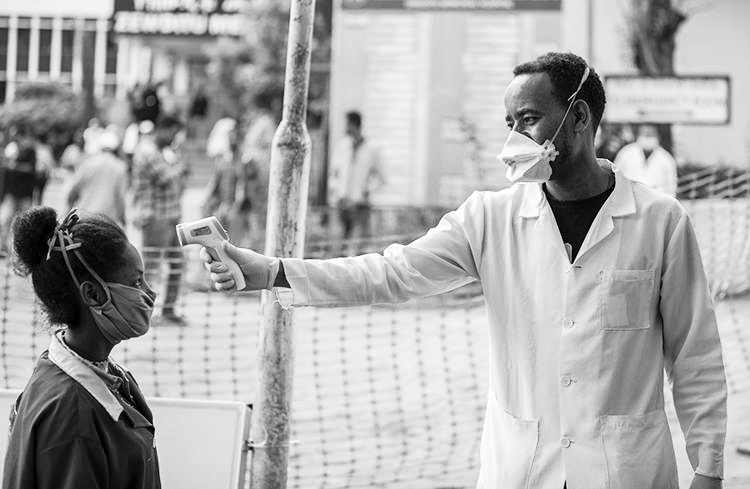
Foreign Affairs Minister Gedu Andargachew and his Chinese counterpart Wang Yi held a telephone conversation about ways of further cooperating in the fight against COVID-19, according to Ministry of Foreign Affairs.
Gedu commended the Chinese people and government on their successful battle against COVID-19 pandemic. He also expressed his profound appreciation for the efforts being made by the Chinese government and private companies to provide medical supplies and protective gears for African countries, including Ethiopia.
Recalling the long-standing relations between the two countries, FM Gedu expressed his unshakable belief that China would consider Ethiopia’s request for debt relief. State Counselor and Minister for Foreign Affairs of China, Wang Yi on his part reiterated China’s appreciation and gratitude to Ethiopia for standing shoulder to shoulder with China in this difficult moment.
Yi further emphasized China’s commitment to support Africa, including Ethiopia, in mitigating the economic impact of the COVID-19 scourge.
Ethiopia’s Minister of Foreign Affairs, Gedu Andargachew, also hold conversation over the phone with Irish Minister for Foreign Affairs and Trade, Simon Coveney, on bilateral affairs and the COVID-19 pandemic.
Gedu expressed his gratitude for the development assistance received from Ireland which is in line with Ethiopia’s development strategy. He also expressed gratitude for the solidarity and high-level commitment shown by Ireland to working together during this pandemic.
The Irish Foreign Minister thanked Gedu for expressing condolences for the COVID-19 victims in Ireland. Raising concerns on the spread of the pandemic and loss of life in Ethiopia and Africa, Coveney stressed the need to work in unison to face the challenges posed by the virus.
On the other hand the Government of Korea has also donated COVID-19 prevention medical instruments worth about 470 thousand USD to Ethiopia’s Ministry of Health.
The 470,000 USD assistance included testing kits, disinfectant, hand sanitizer, and masks. During the handing over ceremony, Minister of Health Dr. Lia Tadesse expressed her gratitude for the continuous support and solidarity by the Korean government and the Korean community in Ethiopia.
“It is a great pleasure for us today to receive the donations made by the Korean government, in collaboration with Korean non-governmental organizations, in the fight for COVID-19,” she said, adding that the “testing kits are really critical this time for the expansion of testing to mitigate the virus.”
The minister noted that Korea is a close partner of the Government of Ethiopia in many ways, working in the health system by supporting in the strengthening of maternal and child health as well as other areas.
Korea’s Ambassador to Ethiopia, Hoonmin Lim said “to beat COVID19 and to recover from the devastation it has wrought, unprecedented level of global solidarity and coordinated action is needed.”
He added that the Korean government is prepared to fully share all information and insight garnered in its ongoing fight against COVID19 with partners and the international community.
Ambassador Lim said Ethiopia and Korea have been working to fight the new enemy, COVID19, and emerge victorious; and the embassy will exert its utmost effort to strengthen solidarity with Ethiopia in order to overcome this crisis along with the entire Korean community, including private and non-governmental entities in Ethiopia.
The Korean government will supply additional supplies such as test kits and prevention supplies where Ethiopia needs utmost, the ambassador pledged. “This is the first round of support and the next round of support will continue.”
Details of today’s support, according to the embassy, are testing kits worth 250 thousand USD; disinfectant worth 30 thousand USD, hand sanitizer 30 thousand USD; masks and cash 100 thousand USD or three million Birr; masks worth 50 thousand USD; and face shield masks and transportation estimated 10 thousand USD.
The Ethiopian Herald May 16/2020
BY HAILE DEMEKE
GERD initial reservoir, Ethiopia’s unwavering stance
Senior officials of the Ethiopian Government, including Prime Minister Dr. Abiy Ahmed and members of the GERD negotiating team have discussed the issue of the Grand Ethiopian Renaissance Dam (GERD) to evaluate the level of the dam to start the initial filling phase and to set direction on subsequent issues with the downstream countries.
During the discussion, the Government has disclosed its firm stance to start the initial filling phase of the dam as per the schedule, on the coming rainy season, July 2020 after evaluating the overall readiness of the projects current situation.
At the discussion, it was reported that the civil works of the dam has reached 87 percent while the general construction of the dam reached 73 percent. This week, Engineer Kifle Horo also stated that the civil works of the construction is on good development and will complete within short period.
After assessing the overall construction of the dam, after the discussion, the Ethiopian government decided to start the first filling phase by reserving water since starting on July, as per the schedule.
The place selected to rest the water is also under preparation where the forest that covers the needed land is to deforest in less than two months collaborating with Benishangul Gumuz State administration, the founding region of the project.
The government decided to award the forest clearing work to the regional state to open job opportunity for the youth of Benishangul Gumuz and the surrounding. As per the decision, Ethiopian Electric Power and the State administration are communicating and the State’s administration has decided to start the work by organizing the youth.
Benishangul Gumuz State Communication head Meles Bisrat said that EEP gave the project to the regional state with 33 million birr budget to complete the work in less than two months. To start the work of the deforestation, thousands of youths are organizing and will start their job soon where necessary preparations are going well.
Similarly, during the discussion forum, Ethiopia Minister of Water, Irrigation and Energy Engineer Seleshi Bekele (PhD) announced that Ethiopia is preparing its own stance to the letter written sent by Egypt to the United Nations Security Council protesting Ethiopia’s plan to start filling of GERD. According to Dr. Seleshi Ethiopia has prepared a comprehensive document to expose the reality about the GERD as a response for the Egypt’s complain over filling of GERD.
Seleshi noted that to reach a comprehensive agreement on GERD issue, it is only set in a negotiation table of the three countries. He also assured that Ethiopia will continue its filling plan and no one can influence its plan since GERD is on construction with protecting all international law and principles.
As to him “GERD is not a simple project for Ethiopia, it is the matter of existence and generational continuity”. He also announced that Ethiopia is ready to resume the tripartite talk that was started with its own initiative.
The Ethiopian Herald May 16/2020
BY DARGIE KAHSAY
Responses of the government to the shocks of COVID 19 pandemic
- Recent Measures taken: (Approved on 30 April 2020)
• Remit tax debt (including principal tax, interest, and penalties) until Fiscal Year 2015 for more than 3099 taxpayers.
• Remit interest and penalty for taxpayers who have received a tax assessment notification
for the period 2016-2019. The taxpayers must pay 25% of the principal tax owed within 30
days and pay 75% of the principal within one year from the date on which installment agreement has been signed.
• Waiver of 30% rental tax for Education institutions and Micro and Small Enterprises by regional governments and city administrations. Waiver of rental income tax also includes taxpayers who own residential properties and have waived rent payments for their tenants,whose monthly rent does not exceed Birr10, 000.
Waive four-month employment tax of workers who are required to stay home with their salary. This allows the government to share about 50% of employers wage cost of workers who are staying at home for two months.
• Extend the payment period for Value Added Tax (VAT) and Turnover Tax. The filing time of returns and payment of VAT and Turnover Tax for the months of March, April and May are extended until June 2020, without penalty and interest.
• Tax deduction for COVID related charitable donations; deduction raised from 10% to 20% of the taxable income for 2012 E.C fiscal year to thank donors and encourage more support.
• Loss carry forward: Loss incurred in 2020 fiscal year will be allowed to be carried forward to the next fiscal year even if the business has already carried forward two losses.
• The pension contribution of private organizations for the month of April, May and June has been deferred until to July 2020.
• Loan/Credit Support for Small and Micro Enterprises. The Development Bank of Ethiopia avails loan to solve the financial constraints of small and micro enterprises by opening a special window for quick disbursements. Credit will also be availed to Micro-Finance Institutions and cooperatives to support small-scale business and farmers and consumers cooperatives respectively.
• Support for manufacturers that export their products. Based on the assessment to be conducted by the Ethiopian Investment Commission, manufacturers who cannot export their products to the international market will be allowed to supply their products to local market for the coming two months.
Earlier Measures (March – April 2020)
• A Birr 5bn (around $150 million) preliminary budget allocated for emergency expenditure
• Removal of import taxes on COVID-19 related items
• Faster value-added tax refunds for businesses
• Birr 21bn (around $630 million) support for banks to address the expected liquidity shortage from expected lower deposits and loan collection, and to make available working capital for sectors impacted by the COVID-19 pandemic
• Priority access to foreign exchange importers and producers of COVID-19-related goods
• Raising of mobile money transfer limits
• Relaxing of the Central Bank’s non-performing loan directive to allow banks to reschedule loan payments for highly affected sectors like horticulture, hotels, and tourism among others
• Removal of minimum price for export flower
Next Measures: Since the economic impacts of the Corona virus cannot be totally addressed with the measures outlined above, the government will continue to assess the situation and introduce measures as needed.
The Ethiopian Herald May 16/2020
BY STAFF REPORTER
The 1989 Ethiopian coup d’état attempt
It was on 16 May 1989, the Ethiopian coup d’état attempt took place, while President of the People’s Democratic Republic of Ethiopia (PDRE) Mengistu Haile Mariam was out of the country for a four-day state visit to East Germany.
As history tells us, the military Junta by the name of Derg came out of the 1974 revolution that thrown out the Solomonic dynasty. It was first organized by the representatives of the Military units of different divisions.
After the possession of the political power, the Derg adopted socialism as an ideology of the state and devised radical political and economic policies. From the inception, the formation of government by the military wing had faced extreme criticism by the pro-socialist forces that were the initiators of the change.
Most revolutionary groups poked upon the Derg, requested the establishment of civilian rule though the Derg was unwilling. In the heyday of this disagreement, one of the Dé facto party called All Ethiopian Socialist Movement (AESM) formed an alliance with the military group. The other civilian party named by Ethiopian Peoples` Revolutionary Party (EPRP) declared “White Terror” against the leadership of the Derg and AESM.
As a result the “Red Terror” was declared by the Derg aided by AESM. Consequently, the Derg had hammered the EPRP until the party`s leaders dismantled. The capacity of the EPRP to challenge the power of the Derg gradually declined. However, the military rule did not defeat the ethnic based resistances of the north and elsewhere.
On the other hand, there were worth-mentioning crises events that the leaders properly endeavored to solve. For instance, the security crises of the nation during the late 1970s was the pivotal decisions of the Derg and the chairman of the committee that saved the nation from the savage and fierce invasion of Siad Bare`s forces.
According to Fikresilassie, the leadership of Mengistu in getting support from the socialist countries through diplomatic persuasions, the process of maneuvering to mobilize the public, and the deployment of newly recruited troops were successful. In this disastrous time, leaders managed the shift of public attention from the local political problem to the external issue.
The result of the combination of different crisis decisions of the leaders culminated with the victory Ethiopia`s forces. The regime enjoyed relative public support. The victory was also an impetus for the initiation of the “Red Star Campaign” against the rebelling group in Eritrea. However, unlike the war against Somalia, the civil war in Eritrea did not end up with the victory of the Derg.
Gradually, the rebels such as EPLF and TPLF became strong enough to shake the regime. Military defeats became common. There were a number of strategic military losses for the Derg especially, in the late 1980s.
By March 1988, the mechanized army of the government defeated, weapons and a strategic place in Eritrea called “Afbet” were captured by the EPLF; and 20,000 troops were dismantled, as to Bahiru Zewdie.
According to Bahiru, before this defeat, the commander of the said front, Major General Tariku Laynie executed by Mingistu following the disagreement between them concerning the leadership of the war. This resulted in the moral damage of the combatant forces. This moral failure was one of the factors for the defeat.
In Shire Endasilasie, by February 1989 another defeat occurred, and TPLF got a significant victory. In this battle, the Third Division revolutionary mechanized force with 40,000 troops was obliterated. The forces of the regime have withdrawn from the entire Tigray areas.
The defeats in Afbet and Shire marked the beginning of the end of the Derg regime. In the midst of these losses, senior officers, known to be dissatisfied with the President’s pursuit of protracted civil war, in which the army has suffered from aforementioned severe defeats, staged a coup on 16 May 1989.
In fact, the 1989 coup was plotted by the military chiefs of the armed forces against Mengistu Hailemariam`s regime. The coup attempt was led by former Ethiopian Air force commander, Major General Fanta Belay; the Minister of Defense, Hailegiyorgis Habtemariam, was killed by Major General Abera Abebe after refusing to join the revolt.
But, it was foiled within three days in Asmara and Addis Ababa, when Mengistu returned within 24 hours. Nine generals, including the then-current Air Force Commander and the Army Chief of Staff, died as the coup was crushed. This unfortunate coup exposed the coup makers for Mengistu`s revenge. Major General Merid Negusie, and the commander of the air force, Major General Amha Desta, had been killed in the fighting.
Major General Demissie Bultu and a number of his compatriots were killed by the pro-Mengistu regime Commandos in Asmara. The body of Demissie dragged inhumanly on the street of Asmara, Bahiru explained.
Further, as a result of this crisis, between 300 and 400 officers were reported to be arrested. On 26 December 1989, Mengistu`s government reported to have charged fourteen military officers with mutiny and attempting to overthrow Mengistu. Later, “12 of them including the army and police chief executed” by Mengistu. After being captured, Major General Fanta Belay was killed while trying to escape. The situation, particularly the revenges of the President was deterrence for other officers; signaling them that their life had no guarantee.
Finally, the regime had considered this crisis as a threat. As a result, the crisis decisions had emphasized on defusing blames, and defending the status quo. Negotiations and power sharing scheme were discredited. The coup d’état and specially the merciless measures of regime resulted in drought of leaderships of the military units.
The Ethiopian Herald May 16/2020
BY ZELALEM GIRMA



